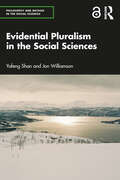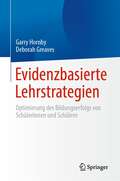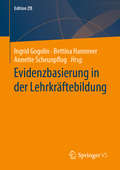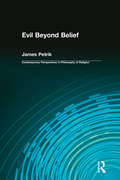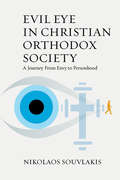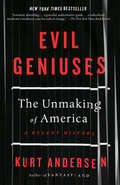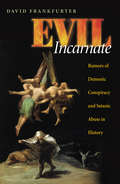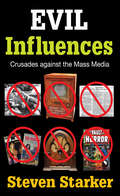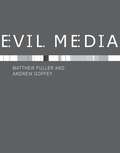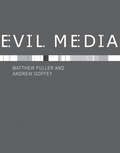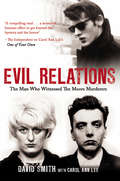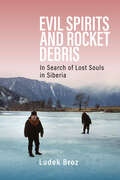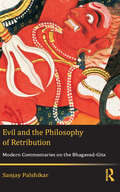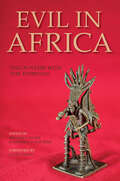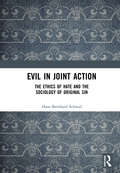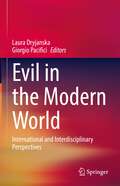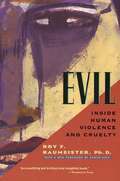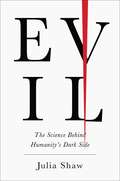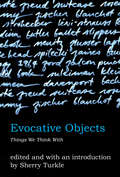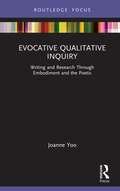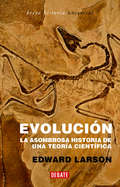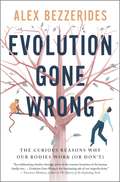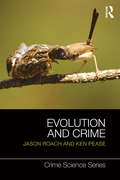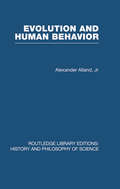- Table View
- List View
Evidential Pluralism in the Social Sciences (Philosophy and Method in the Social Sciences)
by Jon Williamson Yafeng ShanThis volume contends that Evidential Pluralism—an account of the epistemology of causation, which maintains that in order to establish a causal claim one needs to establish the existence of a correlation and the existence of a mechanism—can be fruitfully applied to the social sciences. Through case studies in sociology, economics, political science and law, it advances new philosophical foundations for causal enquiry in the social sciences. The book provides an account of how to establish and evaluate causal claims and it offers a new way of thinking about evidence-based policy, basic social science research and mixed methods research. As such, it will appeal to scholars with interests in social science research and methodology, the philosophy of science and evidence-based policy.
Evidenzbasierte Lehrstrategien: Optimierung des Bildungserfolgs von Schülerinnen und Schülern
by Garry Hornby Deborah GreavesDieses Buch befasst sich mit evidenzbasierten Praktiken, die einen effektiven Unterricht ermöglichen, um einen optimalen Bildungserfolg für Schüler zu gewährleisten. Es identifiziert Schlüsselstrategien, die auf umfangreichen Forschungsergebnissen basieren, welche ihre Wirksamkeit bei der Verbesserung der Schülerergebnisse bestätigen. Das Buch bietet Lehrkräften einen Leitfaden zur Unterscheidung zwischen Strategien, die evidenzbasiert sind, und solchen, für die es nur wenige oder gar keine Belege gibt. Es beschreibt gängige Unterrichtsstrategien, die häufig in Schulen eingesetzt werden, obwohl ihre Wirksamkeit kaum belegt ist. Darüber hinaus werden in dem Buch acht wichtige evidenzbasierte Unterrichtspraktiken genannt, die von den Lehrkräften direkt umgesetzt werden können, die theoretischen und forschungsbasierten Grundlagen für jede dieser Strategien erläutert, und es werden Leitlinien für Sonder- und allgemeinbildende Lehrkräfte gegeben, wie sie diese Strategien am effektivsten anwenden können, mit Links zu Videobeispielen für ihre Anwendung im Unterricht. Der Text untersucht auch häufige Hindernisse für den Einsatz evidenzbasierter Praktiken in Schulen. Es werden die Auswirkungen auf die Lehrerausbildung untersucht, wobei der Schwerpunkt auf der Ausbildung von Pädagogen liegt, damit sie evidenzbasierte Strategien erkennen und effektiv umsetzen können, wobei diejenigen vermieden werden, die nicht evidenzbasiert sind, selbst wenn sie in den Schulen beliebt sind. „Evidenzbasierte Lehrstrategien“ ist ein unverzichtbares Nachschlagewerk für Forscher, Fachleute und Studenten der pädagogischen Psychologie, der Kinder- und Schulpsychologie und der Sozialarbeit, die daran interessiert sind, wirksame Lehrmethoden kennenzulernen und umzusetzen, die das Engagement der Schüler und ihre schulischen Leistungen verbessern, das sozial-emotionale Lernen stärken und die Schulabbrecherquote senken.
Evidenzbasierung in der Lehrkräftebildung (Edition ZfE #4)
by Ingrid Gogolin Bettina Hannover Annette ScheunpflugDas Buch nähert sich dem Thema ‚Datengestützte Lernformate‘ im Kontext der Ausbildung von Lehrerinnen und Lehrern aus einer bilanzierenden Perspektive. Vorgestellt und zusammengefasst werden Rahmenbedingungen, theoretische Begründungen und Zielsetzungen des Reformansatzes. Erfahrungsberichte zur praktischen Umsetzung und der empirischen Überprüfung des innovativen Lernformats ergänzen die Darstellung.
Evil Beyond Belief
by James PetrikAn introduction to and overview of the entire problem of evil, from a philosophical perspective. The text aims to be introductory and inclusive, both by familiarizing students with the main contours of the intellectual terrain, and by pointing them in the direction of further resources.
Evil Eye in Christian Orthodox Society: A Journey from Envy to Personhood
by Nikolaos SouvlakisEvil eye is a phenomenon observed globally and has to do with the misfortune and calamities that we can cause to someone else out of jealousy of their possessions. The book engages with evil eye beliefs in Corfu and investigates the Christian Orthodox influences on the phenomenon and how it affects individuals’ reactions to it. Developing an interdisciplinary dialogue, it offers a fresh view of evil eye as a facilitator of wellbeing rather than a generator of calamities.
Evil Eye in Christian Orthodox Society: A Journey from Envy to Personhood
by Nikolaos SouvlakisEvil eye is a phenomenon observed globally and has to do with the misfortune and calamities that we can cause to someone else out of jealousy of their possessions. The book engages with evil eye beliefs in Corfu and investigates the Christian Orthodox influences on the phenomenon and how it affects individuals’ reactions to it. Developing an interdisciplinary dialogue, it offers a fresh view of evil eye as a facilitator of wellbeing rather than a generator of calamities.
Evil Geniuses: The Unmaking of America: A Recent History
by Kurt AndersenWhen did America give up on fairness? The New York Times bestselling author of Fantasyland tells the epic history of how America decided that big business gets whatever it wants, only the rich get richer, and nothing should ever change—and charts a way back to the future. <P><P>During the twentieth century, America managed to make its economic and social systems both more and more fair and more and more prosperous. A huge, secure, and contented middle class emerged. All boats rose together. But then the New Deal gave way to the Raw Deal. Beginning in the early 1970s, by means of a long war conceived of and executed by a confederacy of big business CEOs, the superrich, and right-wing zealots, the rules and norms that made the American middle class possible were undermined and dismantled. The clock was turned back on a century of economic progress, making greed good, workers powerless, and the market all-powerful while weaponizing nostalgia, lifting up an oligarchy that served only its own interests, and leaving the huge majority of Americans with dwindling economic prospects and hope. <P><P>Why and how did America take such a wrong turn? <P><P> In this deeply researched and brilliantly woven cultural, economic, and political chronicle, Kurt Andersen offers a fresh, provocative, and eye-opening history of America&’s undoing, naming names, showing receipts, and unsparingly assigning blame—to the radical right in economics and the law, the high priests of high finance, a complacent and complicit Establishment, and liberal “useful idiots,” among whom he includes himself. <P><P>Only a writer with Andersen’s crackling energy, deep insight, and ability to connect disparate dots and see complex systems with clarity could make such a book both intellectually formidable and vastly entertaining. And only a writer of Andersen&’s vision could reckon with our current high-stakes inflection point, and show the way out of this man-made disaster. <P><P><b>A New York Times Bestseller</b>
Evil Incarnate: Rumors of Demonic Conspiracy and Satanic Abuse in History
by David FrankfurterIn the 1980s, America was gripped by widespread panics about Satanic cults. Conspiracy theories abounded about groups who were allegedly abusing children in day-care centers, impregnating girls for infant sacrifice, brainwashing adults, and even controlling the highest levels of government. As historian of religions David Frankfurter listened to these sinister theories, it occurred to him how strikingly similar they were to those that swept parts of the early Christian world, early modern Europe, and postcolonial Africa. He began to investigate the social and psychological patterns that give rise to these myths. Thus was born Evil Incarnate, a riveting analysis of the mythology of evil conspiracy. <p><p> The first work to provide an in-depth analysis of the topic, the book uses anthropology, the history of religion, sociology, and psychoanalytic theory, to answer the questions "What causes people collectively to envision evil and seek to exterminate it?" and "Why does the representation of evil recur in such typical patterns?" <p><p> Frankfurter guides the reader through such diverse subjects as witch-hunting, the origins of demonology, cannibalism, and the rumors of Jewish ritual murder, demonstrating how societies have long expanded upon their fears of such atrocities to address a collective anxiety. Thus, he maintains, panics over modern-day infant sacrifice are really not so different from rumors about early Christians engaging in infant feasts during the second and third centuries in Rome. <p><p> In Evil Incarnate, Frankfurter deepens historical awareness that stories of Satanic atrocities are both inventions of the mind and perennial phenomena, not authentic criminal events. True evil, as he so artfully demonstrates, is not something organized and corrupting, but rather a social construction that inspires people to brutal acts in the name of moral order.
Evil Influences: Crusades Against the Mass Media
by Steven StarkerEach new development in the mass media has elicited highly charged criticism from alarmed observers. Comics, romance novels, music videos, and even movies, radio, and television have all been denounced as threats to children, teenagers, adults, and even the stability of civilization itself. Organized into community groups, citizens have repeatedly taken militant action against the media, ranging from book burnings to blacklisting and from harassment of individual publishers to attempts to regulate entire industries. Investigative committees and commissions are not uncommon. What is it about the media that generates such attacks? 'Evil Influences' examines the historical, sociological, and psychological background of current controversies regarding the media. Starker finds that even though it is couched in logic or scientific theory, such hostility is almost always a byproduct of fear--fear of imagination and fantasy, fear of change, fear of human aggression and sensuality. Successive media developments have challenged traditional perceptions and habits by introducing powerful visual and emotional elements into mass communication. Because they frighten and threaten a part of the audience, new forms of mass media engender public outrage and become easy scapegoats, accused of everything from stimulation of violence to promotion of conformity. This book is addressed to those who inevitably participate in media debates--social scientists, educators, communications professionals, the clergy, and educated parents. Its intention is to prepare us for the arrival of new media forms and their associated threats.
Evil Media
by Matthew Fuller Andrew GoffeyEvil Media develops a philosophy of media power that extends the concept of media beyond its tried and trusted use in the games of meaning, symbolism, and truth. It addresses the gray zones in which media exist as corporate work systems, algorithms and data structures, twenty-first century self-improvement manuals, and pharmaceutical techniques. Evil Media invites the reader to explore and understand the abstract infrastructure of the present day. From search engines to flirting strategies, from the value of institutional stupidity to the malicious minutiae of databases, this book shows how the devil is in the details. The title takes the imperative "Don't be evil" and asks, what would be done any differently in contemporary computational and networked media were that maxim reversed. Media here are about much more and much less than symbols, stories, information, or communication: media do things. They incite and provoke, twist and bend, leak and manage. In a series of provocative stratagems designed to be used, Evil Media sets its reader an ethical challenge: either remain a transparent intermediary in the networks and chains of communicative power or become oneself an active, transformative medium.
Evil Media
by Matthew Fuller Andrew GoffeyA philosophical manual of media power for the network age.Evil Media develops a philosophy of media power that extends the concept of media beyond its tried and trusted use in the games of meaning, symbolism, and truth. It addresses the gray zones in which media exist as corporate work systems, algorithms and data structures, twenty-first century self-improvement manuals, and pharmaceutical techniques. Evil Media invites the reader to explore and understand the abstract infrastructure of the present day. From search engines to flirting strategies, from the value of institutional stupidity to the malicious minutiae of databases, this book shows how the devil is in the details. The title takes the imperative “Don't be evil” and asks, what would be done any differently in contemporary computational and networked media were that maxim reversed.Media here are about much more and much less than symbols, stories, information, or communication: media do things. They incite and provoke, twist and bend, leak and manage. In a series of provocative stratagems designed to be used, Evil Media sets its reader an ethical challenge: either remain a transparent intermediary in the networks and chains of communicative power or become oneself an active, transformative medium.
Evil Relations (formerly published as Witness): The Man Who Bore Witness Against the Moors Murderers
by Carol Ann Lee David SmithThe chief prosecution witness in the Moors Murders trial gives his account of the case after more than four decades of silenceDespite standing as chief prosecution witness in the Moors Murders trial, David Smith was vilified by the public due to the accusations thrown at him by Myra Hindley and Ian Brady about his involvement in their crimes. Hindley's later confession that she and Brady had lied in an attempt to reduce their sentences did little to diminish the slurs against his name. For over four decades, Smith was asked by writers and film-makers to tell his story. Apart from a handful of brief interviews, he always refused. Carol Ann Lee met Smith during her research for One of Your Own, her critically acclaimed biography of Hindley, following which he finally agreed to reveal all. In Evil Relations (previously published as Witness), interviews, archival research and, most significantly, David Smith's own vivid memoir are fused to create an unforgettable, often harrowing account of his life before, during and after the Moors Murders.David Smith lived in rural Ireland with his wife prior to his death in May 2012. He is survived by four children and several grandchildren. Carol Ann Lee is an acclaimed biographer and has written extensively on the Holocaust. Her most recent publication, One of Your Own, focused on the life and death of Myra Hindley.
Evil Spirits and Rocket Debris: In Search of Lost Souls in Siberia
by Ludek BrozThe Altai Republic in southern Siberia is renowned for excavations of frozen mummies from high-altitude burial sites. Less well-known is the fact that it hosts fallout zones for the second stages of rockets launched from the Baikonur cosmodrome. Local inhabitants blame ‘evil spirits’ released by archaeological work and toxic fuel from rocket debris for their misfortunes. This book explores the divergent fates of such claims when confronted with state-fostered ‘rationalisms’ of science and governance.
Evil and the Philosophy of Retribution: Modern Commentaries on the Bhagavad-Gita (100 Cases)
by Sanjay PalshikarWhat is ‘evil’? What are the ways of overcoming this destructive and morally recalcitrant phenomenon? To what extent is the use of punitive violence tenable? Evil and the Philosophy of Retribution compares the responses of three modern Indian commentators on the Bhagavad-Gita — Aurobindo Ghose, Bal Gangadhar Tilak and Mahatma Gandhi. The book reveals that some of the central themes in the Bhagavad-Gita were transformed by these intellectuals into categories of modern socio-political thought by reclaiming them from pre-modern debates on ritual and renunciation. Based on canonical texts, this work presents a fascinating account of how the relationship between ‘good’, ‘evil’ and retribution is construed against the backdrop of militant nationalism and the development of modern Hinduism. Amid competing constructions of Indian tradition as well as contemporary concerns, it traces the emerging representations of modern Hindu self-consciousness under colonialism, and its very understanding of evil surrounding a textual ethos. Replete with Sanskrit, English, Marathi, and Gujarati sources, this will especially interest scholars of modern Indian history, philosophy, political science, history of religion, and those interested in the Bhagavad-Gita.
Evil in Africa: Encounters With The Everyday
by David Parkin William C. Olsen Walter E. van van BeekWilliam C. Olsen, Walter E. A. van Beek, and the contributors to this volume seek to understand how Africans have confronted evil around them. Grouped around notions of evil as a cognitive or experiential problem, evil as malevolent process, and evil as an inversion of justice, these essays investigate what can be accepted and what must be condemned in order to evaluate being and morality in African cultural and social contexts. These studies of evil entanglements take local and national histories and identities into account, including state politics and civil war, religious practices, Islam, gender, and modernity.
Evil in Joint Action: The Ethics of Hate and the Sociology of Original Sin
by Hans Bernhard SchmidJoining insights from social science and philosophy, this book offers a nuanced view on the discourse of evil, which has been on the rise in the West in recent years. Exploring the famous ‘Pear Theft’ episode in St Augustine’s Confessions, it looks beyond the theological implications of the event to focus instead on the secular insights that it offers when the event is placed in the context of social thought. With attention to Augustine’s lengthy reflections on a seemingly marginal episode, the author contends that it is possible to discern the elements of a convincing account of intentional evil action, the Pear Theft representing a case of joint radical improvisation that lacks collective deliberation. As such, a new perspective emerges on familiar and more intuitive forms of evil in joint action that involve group identification and institutional action. Evil in Joint Action will appeal to scholars of sociology, social theory and philosophy with interests in ethics, collective action and concepts of evil.
Evil in the Modern World: International and Interdisciplinary Perspectives
by Laura Dryjanska Giorgio PacificiThis interesting volume focuses on a set of phenomena which increasingly alarm the political world and public opinion: from the more obvious ones like torture, disease, human trafficking, abuse, genocide, displacement, to more subtle forms found in sports, technology and law. It looks at how and why these phenomena are universally condemned, and could be considered to threaten the very foundations of modern democracy; yet continue to be tolerated. The volume therefore goes beyond what Hannah Arendt has called the "banality of evil" and discusses the presence of condemned and heinous practices in society as fluid and chaotic but as non-trivial; capable of great transmutations through various epochs. Practices and actions considered as "evil" manifest in situations where individuals or groups hold power or seize power, and the contributions in this volume explore the close relation between power and evil. The volume draws upon sociology, psychology, cultural studies, political science, as well as philosophy, theology, anthropology, and neurology of the individual and of the group to provide a comprehensive understanding of the multiple facets of evil in the contemporary world.
Evil: Inside Human Violence and Cruelty
by Roy F. BaumeisterWhy is there evil, and what can scientific research tell us about the origins and persistence of evil behavior? Considering evil from the unusual perspective of the perpetrator, Baumeister asks, How do ordinary people find themselves beating their wives? Murdering rival gang members? Torturing political prisoners? Betraying their colleagues to the secret police? Why do cycles of revenge so often escalate? Baumeister casts new light on these issues as he examines the gap between the victim's viewpoint and that of the perpetrator, and also the roots of evil behavior, from egotism and revenge to idealism and sadism. A fascinating study of one of humankind's oldest problems, Evil has profound implications for the way we conduct our lives and govern our society.
Evil: The Science Behind Humanity's Dark Side
by Julia ShawWhat is it about evil that we find so compelling? From our obsession with serial killers to violence in pop culture, we seem inescapably drawn to the stories of monstrous acts and the aberrant people who commit them. But evil, Dr. Julia Shaw argues, is largely subjective. What one may consider normal, like sex before marriage, eating meat, or working on Wall Street, others find abhorrent. And if evil is only in the eye of the beholder, can it be said to exist at all? In [this book], Shaw uses an engrossing mix of science, popular culture, and real-life examples to break down timely and provocative issues. How similar is your brain to a psychopath's? How many people have murder fantasies? Can artificial intelligence be evil? Do your sexual proclivities make you a bad person? Who becomes a terrorist? If you could travel back in time, would you kill baby Hitler? In asking these questions, Shaw urges readers to discover empathy and to rethink and reshape what it means to be bad. [This book] is a wide-ranging exploration into a fascinating, darkly compelling subject from a wickedly smart and talented writer.
Evocative Objects: Things We Think With
by Sherry TurkleAutobiographical essays, framed by two interpretive essays by the editor, describe the power of an object to evoke emotion and provoke thought: reflections on a cello, a laptop computer, a 1964 Ford Falcon, an apple, a mummy in a museum, and other "things-to-think-with." For Sherry Turkle, "We think with the objects we love; we love the objects we think with." In Evocative Objects, Turkle collects writings by scientists, humanists, artists, and designers that trace the power of everyday things. These essays reveal objects as emotional and intellectual companions that anchor memory, sustain relationships, and provoke new ideas.These days, scholars show new interest in the importance of the concrete. This volume's special contribution is its focus on everyday riches: the simplest of objects—an apple, a datebook, a laptop computer—are shown to bring philosophy down to earth. The poet contends, "No ideas but in things." The notion of evocative objects goes further: objects carry both ideas and passions. In our relations to things, thought and feeling are inseparable.Whether it's a student's beloved 1964 Ford Falcon (left behind for a station wagon and motherhood), or a cello that inspires a meditation on fatherhood, the intimate objects in this collection are used to reflect on larger themes—the role of objects in design and play, discipline and desire, history and exchange, mourning and memory, transition and passage, meditation and new vision.In the interest of enriching these connections, Turkle pairs each autobiographical essay with a text from philosophy, history, literature, or theory, creating juxtapositions at once playful and profound. So we have Howard Gardner's keyboards and Lev Vygotsky's hobbyhorses; William Mitchell's Melbourne train and Roland Barthes' pleasures of text; Joseph Cevetello's glucometer and Donna Haraway's cyborgs. Each essay is framed by images that are themselves evocative. Essays by Turkle begin and end the collection, inviting us to look more closely at the everyday objects of our lives, the familiar objects that drive our routines, hold our affections, and open out our world in unexpected ways.
Evocative Qualitative Inquiry: Writing and Research Through Embodiment and the Poetic
by Joanne YooEvocative Qualitative Inquiry explores academic research that evokes vitality and life. It provides a road map into integrating the personal with professional to engage in intrinsically meaningful forms of inquiry. The book centers on the key considerations of engaging in evocative forms of writing in the academy. It depicts academic inquiry as an embodied process that is captured and understood through rhythm and resonance. It relays how pleasurable, sensory, and rhythmic forms of inquiry can engender a sense of timelessness, expansiveness, growth, and generativity. Evocative Qualitative Inquiry relates the challenges that may arise from following this less trodden academic inquiry path. It conveys the importance of faith and courage in forging one’s own unique and authentic writing voice. The book concludes with an analogy of a poker game to illustrate how all academic writers possess the embodied capacity to write vibrant words that evoke. Finally, each chapter ends with reflection questions and activities to help readers practice the skills of writing evocatively. This book will be a valuable guide for those seeking evocative writing techniques to engage in vibrant forms of academic research. It is primarily written for academics who desire to learn more about creative, poetic, and embodied writing methodologies.
Evolución: La asombrosa historia de una teoría científica
by Edward J. LarsonUn recorrido por la idea de la evolución, desde sus antecedentes teóricos a la actualidad. La teoría de la evolución no nació solo de la imaginación de Charles Darwin. Desde sus orígenes, la humanidad ha buscado sin tregua respuestas religiosas, filosóficas y científicas a la pregunta clave: ¿de dónde venimos? Con la irrupción y el auge de la ciencia moderna, la controversia sobre la cuestión de la evolución de la especie se aceleró hasta alcanzar el grado de precisión científica actual. En esta brillante obra -que combina un maravilloso anecdotario con el rigor académico- el ganador del Pulitzer Edward J. Larson nos conduce a través de la idea de la evolución, desde sus antecedentes teóricos, pasando por los portentosos logros de Darwin y Wallace, hasta llegar al descubrimiento de la doble hélice del ADN llevada a cabo por los profesores Watson y Crick, la exitosa síntesis neodarwinista actual y la extensión de la sociobiología. Al tiempo que traza el camino de las ideas, Evolución describe una galería de personajes fascinantes, los científicos, exploradores y excéntricos cuyas colaboraciones y disputas impulsaron la teoría evolutiva. De Cuvier, Lamarck, Darwin y Wallace a Haeckel, Galton, Huxley y Mendel o Watson y Crick, Larson recorre este dramatis personae consiguiendo un libro que el reputado científico Ernst Mayr calificó de «delicia intelectual».
Evolution Gone Wrong: The Curious Reasons Why Our Bodies Work (Or Don't)
by Alex Bezzerides&“An unforgettable journey through this twisted miracle of evolution we call &‘our body.&’&” —Spike Carlsen, author of A Walk Around the BlockFrom blurry vision to crooked teeth, ACLs that tear at alarming rates and spines that seem to spend a lifetime falling apart, it&’s a curious thing that human beings have beaten the odds as a species.After all, we&’re the only survivors on our branch of the tree of life. The flaws in our makeup raise more than a few questions, and this detailed foray into the many twists and turns of our ancestral past includes no shortage of curiosity and humor to find the answers.Why is it that human mothers have such a life-endangering experience giving birth? Why are there entire medical specialties for teeth and feet? And why is it that human babies can&’t even hold their heads up, but horses are trotting around minutes after they&’re born?In this funny, wide-ranging and often surprising book, biologist Alex Bezzerides tells us just where we inherited our adaptable, achy, brilliant bodies in the process of evolution.
Evolution and Crime (Crime Science Series)
by Ken Pease Jason RoachHuman physique and behaviour has been shaped by the pressures of natural selection. This is received wisdom in all scientifically informed circles. Currently, the topic of crime is rarely touched upon in textbooks on evolution and the topic of evolution rarely even mentioned in criminology textbooks. This book for the first time explores how an evolution informed criminology has clear implications for enhancing our understanding of the criminal law, crime and criminal behaviour. This book is directed more towards students of criminology than students of evolution. It is suggested that there is scope for more collaborative work, with criminologists and crime scientists exposed to Darwinian thought having much to gain. What is suggested is simply that such thinking provides a fresh perspective. If that perspective yields only a fraction of the understanding when applied to crime as it has elsewhere in science, the effort will have been worthwhile. The authors attempt to provide a modest appraisal of the potential contribution that a more welcoming approach to the evolutionary perspective would make to criminology; both theoretically (by expanding understanding of the complexity of the origins of behaviour labelled criminal) and practically (where the evolutionary approach can be utilised to inform crime control policy and practice). An evolutionary lens is applied to diverse criminological topics such as the origins of criminal law, female crime, violence, and environmental factors involved in crime causation.
Evolution and Human Behaviour: An Introduction to Darwinian Anthropology (Routledge Library Editions: History & Philosophy of Science)
by Alex AllandOriginally published in 1967. This reprints the second edition of 1973, revised and expanded. Evolution and Human Behaviour considers man’s biological and cultural development within the framework of Darwinian evolution. Rejecting analogue models of biological evolution common in the social sciences, the author shows how the theory of biological evolution applies to the study of contemporary human behaviour.
